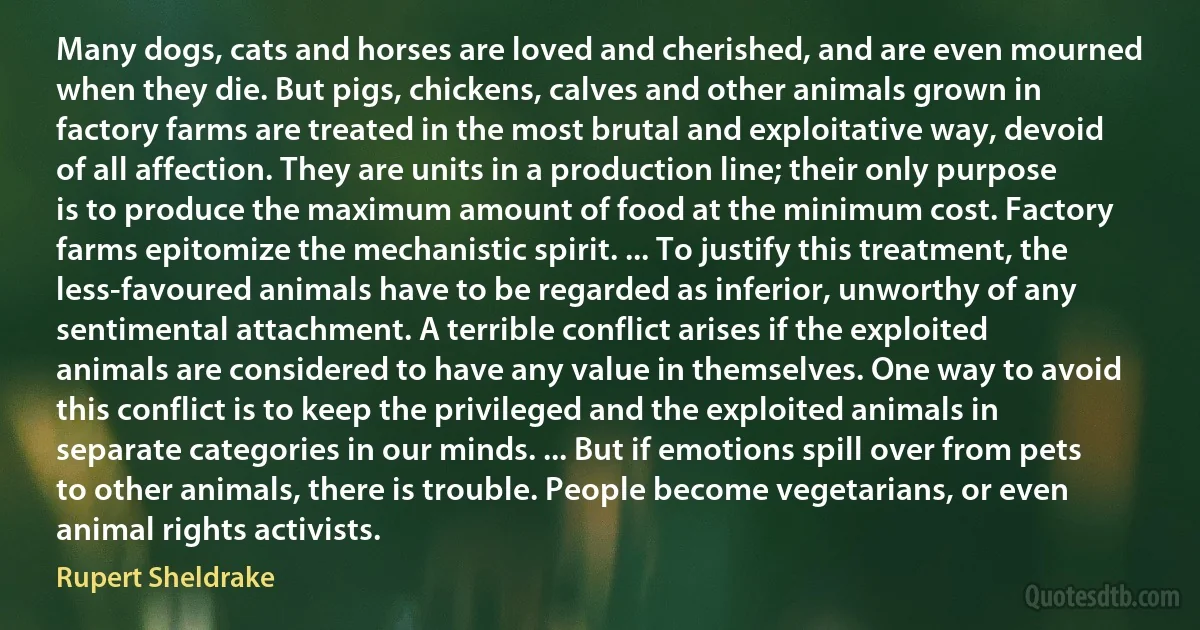
Many dogs, cats and horses are loved and cherished, and are even mourned when they die. But pigs, chickens, calves and other animals grown in factory farms are treated in the most brutal and exploitative way, devoid of all affection. They are units in a production line; their only purpose is to produce the maximum amount of food at the minimum cost. Factory farms epitomize the mechanistic spirit. ... To justify this treatment, the less-favoured animals have to be regarded as inferior, unworthy of any sentimental attachment. A terrible conflict arises if the exploited animals are considered to have any value in themselves. One way to avoid this conflict is to keep the privileged and the exploited animals in separate categories in our minds. ... But if emotions spill over from pets to other animals, there is trouble. People become vegetarians, or even animal rights activists.
Rupert SheldrakeRelated topics
animal calf cost die food inferior line maximum people produce production purpose spill spirit trouble unworthy value way dogs PIGSRelated quotes
In art, origin and value cannot be treated as independent. Those who enjoy poetry and painting must be at least dimly aware of a poet beyond the poem and a painter beyond the picture. If by some unimaginable process works of beauty could be produced by machinery, as a symmetrical colour pattern is produced by a kaleidoscope, we might think them beautiful till we knew their origin, after which we should be rather disposed to describe them as ingenious. And this is not, I think, because we are unable to estimate works of art as they are in themselves, not because we must needs buttress up our opinions by extraneous and irrevelant considerations; but rather because a work of art requires an artist. not merely in the order of natural causation, but as a matter of a-sthetie necessity. It conveys a message which is valueless to the recipient, unless it be understood by the sender. It must be expressive.

Arthur Balfour
Conflict, in turn, produces another problem: how to win or lose without the disagreeing parties incurring too great a cost. This latter point is particularly important. Imagine that two birds engage in a squabble about a desirable nesting area. The interaction can easily degenerate into outright physical combat. Under such circumstances, one bird, usually the largest, will eventually win-but even the victor may be hurt by the fight. That means a third bird, an undamaged, canny bystander, can move in, opportunistically, and defeat the now-crippled victor. That is not at all a good deal for the first two birds. Conflict-and Territory Over the millennia, animals who must co-habit with others in the same territories have in consequence learned many tricks to establish dominance, while risking the least amount of possible damage.

Jordan Peterson
The concept of the « struggle for existence » has been applied to microbial interrelationships in nature in a manner comparable to the effects assigned by Darwin to higher forms of life. It has also been suggested that the ability of a microbe to produce an antibiotic substance enables it to survive Giom. in competition for space and for nutrients with other microbes. Such assumptions ppear to be totally unjustified on the basis of existing knowledge. Before we proceed with a discussion of the formation and activities of antibiotics under natural conditions, we must consider certain fundamental aspects of the problem of antibiotic production under controlled laboratory or factory conditions... All the discussion of a "struggle for existence" in which antibiotics are supposed to play a part, is merely a figment of the imagination, and an appeal to the melodramatic rather than the factual.

Selman Waksman
Microeconomics, including the study of individual choice and of group choice in market and nonmarket processes, has generally been considered a field science as distinct from an experimental science. Hence microeconomics has sometimes been classified as "non-experimental" and closer methodologically to meteorology and astronomy than to physics and experimental psychology (Marschak, 1950, p. 3; Samuelson, 1973, p. 7). But the question of using experimental or nonexperimental techniques is largely a matter of cost, and generally the cost of conducting the most ambitious and informative experiments in astronomy, meteorology, and economics varies from prohibitive down to considerable. The cost of experimenting with different solar system planetary arrangements, different atmospheric conditions, and different national unemployment rates, each under suitable controls, must be regarded as prohibitive.

Vernon L. Smith
Among the various paradigmatic changes in science and mathematics in this century, one such change concerns the concept of uncertainty. In science, this change has been manifested by a gradual transition from the traditional view, which insists that uncertainty is undesirable in science and should be avoided by all possible means, to an alternative view, which is tolerant of uncertainty and insists that science cannot avoid it. According to the traditional view, science should strive for certainty in all its manifestations (precision, specificity, sharpness, consistency, etc.); hence, uncertainty (imprecision, nonspecificity, vagueness, inconsistency, etc.) is regarded as unscientific. According to the alternative (or modem) view, uncertainty is considered essential to science; it is not only an unavoidable plague, but it has, in fact, a great utility.

George Klir
